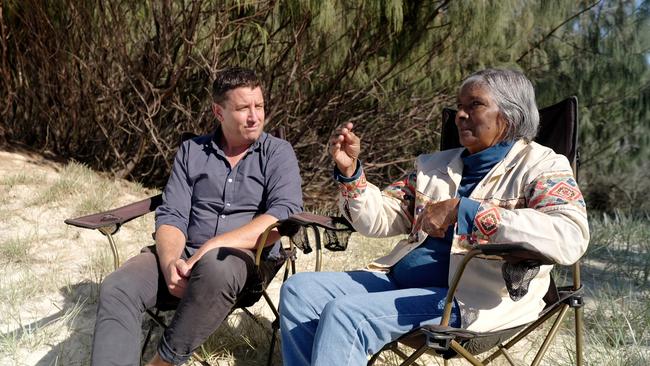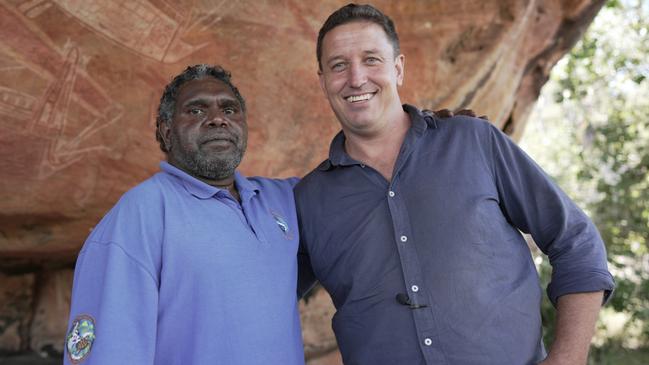The Voice has brought Indigenous issues to the forefront, and something must change
Opponents questioned the focus on The Voice when this was a crisis. I’m not convinced either way. But it might help trigger needed change, argues Matt Cunningham.
Opinion
Don't miss out on the headlines from Opinion. Followed categories will be added to My News.
The Northern Territory has been in the national news a lot this year.
The crime wave crippling Alice Springs. The alleged murders of a bottle-shop attendant and an international student in Darwin. The bashing death of a woman just metres from the Darwin hotel where Minister for Indigenous Australians Linda Burney was staying.
The appalling state of remote Indigenous education revealed in a series of reports in The Australian newspaper.
The death by suicide of three young men in a week on the Tiwi Islands, two of them members of the famous Tiwi Bombers Football Club.
This is life in the Territory. It usually remains hidden from the rest of the nation which has other issues, like a cost-of-living crisis, to deal with. But in 2023 there’s been a sharpened focus on the troubles of a place that for more than four decades since self-government has been trying – and failing miserably – to address shocking rates of Indigenous disadvantage. Life for people in many of the Northern Territory’s remote Aboriginal communities has never been worse.
When Kevin Rudd made his apology to the Stolen Generations in 2008 he vowed to close the gap in life outcomes between Indigenous and non-Indigenous Australians.
He promised a new partnership between Indigenous and non-Indigenous Australians with a goal to halve the gap in literacy, numeracy, employment and infant mortality, and to close the 17-year life-expectancy gap within a generation. Fifteen years on there’s been little improvement.

According to data released by the Productivity Commission in June, just four of the 19 closing-the-gap targets are on track. On the face of it, that’s an appalling outcome. The reality, especially in the Northern Territory, is much worse.
A growing middle-class east-coast Indigenous population is masking the deterioration in life outcomes for Aboriginal people in the Northern Territory, particularly those living in remote communities.
The issue was noted in the Australian Government’s 2020 Closing The Gap report, following significant increases in the number of people identifying as Indigenous in New South Wales and Victoria.
“The jurisdiction which is least impacted by identification issues … is the Northern Territory, where indigenous status identification is most consistent over time,” the report noted.
That report showed the gap was widening in the Northern Territory in issues including infant mortality, early childhood enrolment and school attendance.
The impact of the deterioration of life in remote communities is now playing out on the streets of the Territory’s urban centres of Alice Springs, Katherine and Darwin, as people move there, often in search of alcohol. This situation has been getting worse, particularly over the past three years.

In 2021 I spent a week in Alice Springs reporting on significant increases in domestic violence, gambling and alcohol-fuelled assaults after the Morrison Government doubled welfare payments during Covid-19 and allowed early access to superannuation. No-one much cared.
Last year I spent a week in Alice Springs reporting on the horrific murder of an Aboriginal woman and her baby on the same day the Territory and Federal governments allowed alcohol to return to Aboriginal town camps and outstations. The story attracted little interest outside the NT.
In January this year I returned to Alice Springs and reported on the shocking crime wave crippling the town. Suddenly, amid a debate about the Voice to Parliament, it became the biggest story in the country. Voice advocates said the body was necessary to fix the issues faced in Central Australia.
Opponents questioned the focus on The Voice when this was a crisis that required immediate attention.
I’m not convinced either way on The Voice. But if the country continues to pay as much attention to Indigenous disadvantage in the Northern Territory as it has in the past 10 months, then perhaps something might finally change.
Watch The Voice Referendum LIVE today from 5pm AEDT on Sky News Australia
More Coverage
Originally published as The Voice has brought Indigenous issues to the forefront, and something must change





